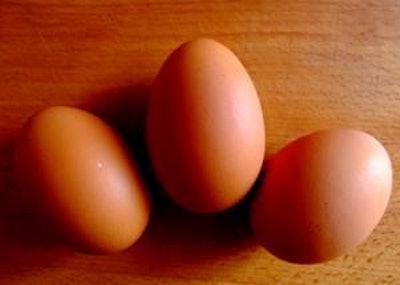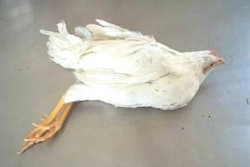
Over the last ten years, Ghanaian poultry farmers have seen their chicken sales dwindle in comparison with those of imported products. Under the umbrella of the Ghana Poultry Farmers’ Association, they actively, but unsuccessfully, campaigned for government protection. They have now adopted a survival strategy of concentrating on eggs, for which they have virtually no competition.
In 2001, the Ghanaian parliament responded to poultry famers’ demands by imposing tariffs on imported poultry products. But to the consternation of farmers, that measure was quickly withdrawn, apparently in response to reminders by Ghana’s trading partners that it was in contravention of international trade protocols to which Ghana was signatory.
As a ‘conciliatory’ gesture, the government established the Poultry Development Board under the chairmanship of poultry farmer Kwabena Darko, owner of Darko Farms, to promote technical efficiency and bio-security in the industry.
Ghana’s poultry industry was a modern, fully- fledged one that supplied the local market and neighbouring countries with live and frozen chicken.
The majority of farmers raised popular European breeds, however, viable local breeds which had been developed by the Animal Research Institute and the universities were also becoming popular, mainly because they combined productivity with hardiness.
A vaccine for Newcastle disease, the main scourge of African poultry, was developed, and quite a number of alternative feed sources were identified. The services of the Ghana Veterinary Service have always been available nationwide.
Concerns
By 2001, however, poultry farmers had started voicing concern about the steady influx of imported products. Recent years have seen such an increase in imports that currently, local production accounts for less than 20% of the market. Imported products are 30-40% cheaper than locally-produced ones, and are therefore in greater demand, especially imported cuts, which offer something for every class of consumer.
Local farmers produce only live and whole frozen chicken. Europe and Brazil have been the main sources of the imported products, but the US is fast becoming a major source.
New direction
In an effort to minimize the massive losses that they have been incurring, farmers have now adopted the survival strategy of moving to egg production. With virtually no competition from imports, egg production is increasing steadily. Local hatcheries, most of which use imported fertile eggs, are beginning to register higher production levels, and commercial feed millers are switching over from broiler to layer feed. The layer birds start laying eggs from 16 weeks. The industry average egg production is 230-250 eggs/layer/year.
No panacea
But poultry farmers say that even a substantial increase in egg production will not offer adequate compensation for their losses. According to one frustrated farmer, ‘we made substantial investments in plant, equipment and personnel for profitable broiler production. The switch to egg production has presented serious problems of logistics and equipment. And sooner or later, the egg market will be saturated, and things will get really tough. All we want is a fair share of the local broiler market’.
Two traditions are, however, offering poultry farmers some consolation. Although more people are eating chicken with greater frequency, chicken is a celebration meal, and everyone enjoys it during Christmas and Easter. Secondly, live chicken is the clear choice, so poultry farmers time their production schedules to coincide with these two occasions.
Farmers are finding it difficult to understand why Ghana cannot follow the example of sister West African nation Nigeria, which banned the import of all poultry products in 2002 in order to encourage local production. They attribute the past government’s failure to protect local farmers to lack of leadership and insensitivity.
But some experts believe that whilst Nigeria’s poultry farmers have registered significant production increases as a result of government protection, they still face serious problems. Lack of credit, and shortages of the main feed ingredients, maize and soybeans –– have prevented the sector from achieving its potential. The general view is that the government’s 2008 Agricultural Policy document projected an increase in the bird population from 166 million to 249 by 2011, which is optimistic. It is also believed that a significant amount of unofficial chicken imports find their way into the country.
Ghanaian poultry farmers are expecting a policy change under the new government which took office in January 2009. But there has not yet been any indication of that. Indeed, if very recent pronouncements of some senior trade officials are anything to go by, then there are no changes in the offing.
For the moment, imported chicken will continue to be abundant in Ghana’s markets. Eggs will also be abundant, thanks to the change of local poultry farmers, who will also endeavor to make live chicken available for Christmas and Easter.

















